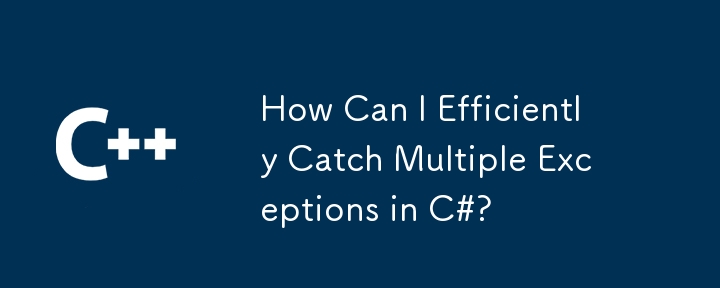How Can I Efficiently Catch Multiple Exceptions in C#?
Jan 20, 2025 pm 11:13 PM
Catch multiple exceptions at the same time
When handling multiple known exceptions in C# code, it can be tedious to catch and handle each exception individually. For example, in the provided scenario:
try
{
WebId = new Guid(queryString["web"]);
}
catch (FormatException)
{
WebId = Guid.Empty;
}
catch (OverflowException)
{
WebId = Guid.Empty;
}To simplify this process, consider using a single catch block that contains all potential exceptions and use a switch statement to differentiate between them:
catch (Exception ex)
{
if (ex is FormatException || ex is OverflowException)
{
WebId = Guid.Empty;
}
else
{
throw;
}
}In this case, any FormatException or OverflowException thrown will be handled by setting the WebId to Guid.Empty, while all other exceptions will be allowed to propagate. This approach simplifies the code while maintaining control over handling expected exceptions.
The above is the detailed content of How Can I Efficiently Catch Multiple Exceptions in C#?. For more information, please follow other related articles on the PHP Chinese website!

Hot Article

Hot tools Tags

Hot Article

Hot Article Tags

Notepad++7.3.1
Easy-to-use and free code editor

SublimeText3 Chinese version
Chinese version, very easy to use

Zend Studio 13.0.1
Powerful PHP integrated development environment

Dreamweaver CS6
Visual web development tools

SublimeText3 Mac version
God-level code editing software (SublimeText3)

Hot Topics
 What are the types of values returned by c language functions? What determines the return value?
Mar 03, 2025 pm 05:52 PM
What are the types of values returned by c language functions? What determines the return value?
Mar 03, 2025 pm 05:52 PM
What are the types of values returned by c language functions? What determines the return value?
 C language function format letter case conversion steps
Mar 03, 2025 pm 05:53 PM
C language function format letter case conversion steps
Mar 03, 2025 pm 05:53 PM
C language function format letter case conversion steps
 What are the definitions and calling rules of c language functions and what are the
Mar 03, 2025 pm 05:53 PM
What are the definitions and calling rules of c language functions and what are the
Mar 03, 2025 pm 05:53 PM
What are the definitions and calling rules of c language functions and what are the
 Where is the return value of the c language function stored in memory?
Mar 03, 2025 pm 05:51 PM
Where is the return value of the c language function stored in memory?
Mar 03, 2025 pm 05:51 PM
Where is the return value of the c language function stored in memory?
 How does the C Standard Template Library (STL) work?
Mar 12, 2025 pm 04:50 PM
How does the C Standard Template Library (STL) work?
Mar 12, 2025 pm 04:50 PM
How does the C Standard Template Library (STL) work?
 How do I use algorithms from the STL (sort, find, transform, etc.) efficiently?
Mar 12, 2025 pm 04:52 PM
How do I use algorithms from the STL (sort, find, transform, etc.) efficiently?
Mar 12, 2025 pm 04:52 PM
How do I use algorithms from the STL (sort, find, transform, etc.) efficiently?









